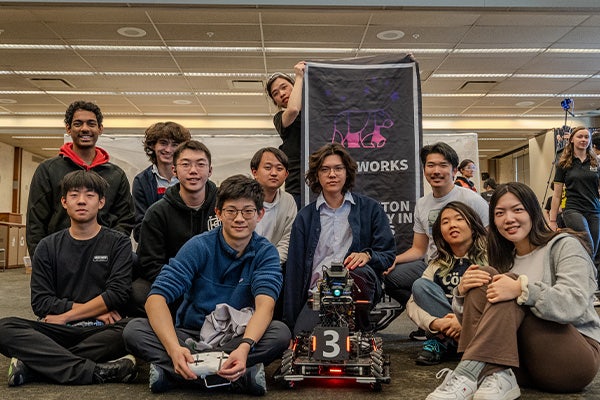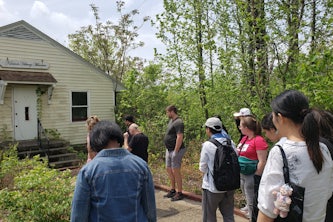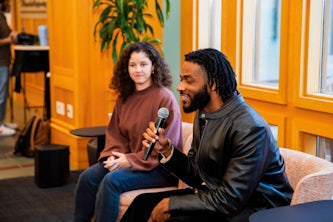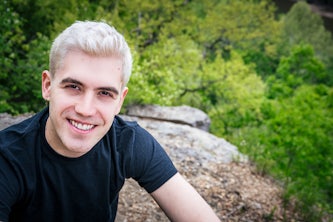The Ursaworks Robotics Club triumphs on the battlefield
The team has upped its game since a fifth-place showing in 2023

Score one for the machines as Ursaworks Robotics Club at Washington University in St. Louis took a victory lap after securing a second-place finish at the 2024 Midwest RoboMaster Competition.
Hosted by Purdue University in March, the club represented the McKelvey School of Engineering as it battled formidable adversaries from engineering-focused rivals Purdue University, the University of Illinois Urbana-Champaign and the Rose-Hulman Institute of Technology. The Ursaworks Robotics Club also vanquished Pennsylvania State University.
The newest team in the arena with about a year of experience, the 12-person WashU squad felled opponent after opponent. Losing only a close match against Virginia Tech, the Robomaster squad refused to be intimidated by larger and more experienced teams. Their second-place finish was a great improvement from its fifth-place finish at the 2023 North American competition.
Following the outing in 2023, the intrepid McKelvey School of Engineering students made several changes that led to greater success.
“Our team overcame a lot of obstacles,” said Mark Quan, Ursaworks founder and president of Ursaworks Robomaster Club majoring in electrical engineering.
“We didn't have a test site, so we moved the robots to my living room where our team worked together to tweak the machines. Another issue was that we did not have CNC machining equipment, automated machines operated by computers that execute pre-programmed sequences of controlled commands. So, we started to 3D print the materials needed to get the prototype ready quickly. That decision saved us a lot of time.
“This year we brought enough spare parts to keep the machine stable,” Quan added. “We have also been very active in lending spare parts to other teams and have a good relationship with many of them.”
Additional upgrades included a camera and a Nvidia Jetson computational unit, which is used to process data from the camera.
The WashU team also adjusted logic controls to make the robot more maneuverable to the driver’s intuition for auto rotation of the chassis. They also added an always-on spinning wheel which allowed the driver to accelerate, shoot projectiles and improve motor response with human inputs.
These innovations provided the Ursaworks squad with improved defensive capabilities and simplified the ammunition loading and firing process.
Anny Qiao, a junior majoring in electrical engineering and computer engineering with a second major in systems science & engineering and a co-president and electrical lead for the Ursaworks RoboMaster team, said the team faced several challenges in its efforts to improve.
“A major challenge we faced was upgrading and redesigning the robot for the North American competition while most of us were spread across the globe last summer,” Qiao said. “Despite this, we designed a new modular chassis that was easy to inspect, fix and transport which contributed to our mobility for different competitions and reduced maintenance difficulty.”
Their hard work paid off at the Midwest competition as the WashU team vanquished their rivals in a series of one-on-one matches between designed, built and customized robots.
“It's like a first-person shooter game, but the shooter is a robot built by each team,” she said. “The driver controls the robot using a camera for video transmission and a remote controller to navigate and shoot around obstacles.”
The competition is robot versus robot as each team attacks the other. Each “hit” to an opposing foe causes damage to the opposing robot, resulting in a loss of health points. Victory occurs when a robot's health points are depleted.
“Achieving total victory required a coordinated effort to keep the robot functioning, our mechanical design, electrical control, circuit design and computer vision teams all work together,” Qiao said.
While the team is still savoring its success at the 2024 Midwest competition, its wheels are firmly on the ground as it prepares for the three-on-three skirmishes at the RoboMaster North America Competition, held later this year in Boulder, Colorado.
“With ongoing development and our passion, we are prepared to tackle new challenges and reach greater heights,” Qiao said. “We look forward to securing a better placement and achieving more technical breakthroughs for this year's North America competition.”



